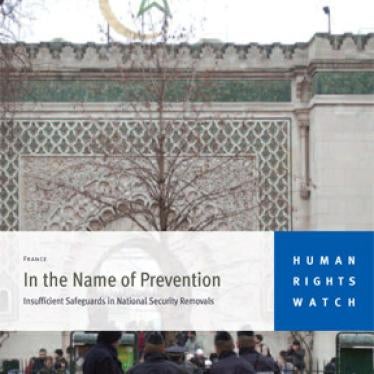France’s human rights record will come under scrutiny today at the United Nations Human Rights Council in a new country assessment mechanism called the Universal Periodic Review (UPR). With France poised to take up the presidency of the European Union in July, this is a perfect time for some straight talk on human rights in the country.
France prides itself on its human rights leadership but no country has a perfect record on human rights. An effective UPR is vital even though it’s not a perfect mechanism: states are evaluated by other states, and the session in April offered mixed results. Praise was often excessive and criticism too timid. Some countries, like the United Kingdom and the Czech Republic, came in for robust questioning, while others, notably Tunisia and Algeria, appeared to get a free ride, including from France.
Whether the French delegation is challenged with hard questions will depend in large part on how much weight is given to the voices of nongovernmental organizations and the UN’s own experts who submitted detailed reports weeks ago.
Among the problems marring France’s human rights record include open expressions of racism, anti-Semitism and Islamophobia, discrimination against France’s “visible minorities,” and violence against women. The government has also been criticized for overcrowding and ill-treatment in prisons, delayed access to a lawyer in police custody and the law on preventive detention for violent offenders. Another serious concern: violations committed in the name of countering terrorism, including criminal laws and procedures that undermine fair trial rights and expulsion procedures that do not ensure a person will not be sent to a country where he or she faces torture. Finally, lack of access to a fair asylum system, as well as the detention and treatment of foreigners in international waiting zones have been heavily criticized.
Although France has pledged full cooperation with the UPR, French officials have expressed the wish that this process be as “positive” as possible to safeguard France’s good image and reputation. But the review is not a public relations exercise. It is an opportunity for France to demonstrate its readiness to subject itself to criticism and address concerns that are raised. After the review, the Human Rights Council will adopt a report with specific recommendations, but ultimately France will only be held to account for implementation of the recommendations it accepts, not the ones it rejects.
Other institutions are watching France and will also issue recommendations, notably the UN Human Rights Committee and Committee on Economic, Social and Cultural Rights. Council of Europe Commissioner for Human Rights Thomas Hammarberg is expected to visit France in May.
All of this scrutiny is a good thing for France, which can rightfully claim its human rights leadership in the community of nations when it defends all human rights, both at home and abroad.







